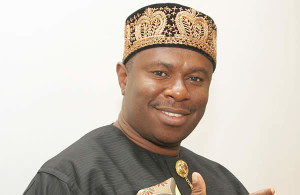
The Director-General, Nigerian Maritime Administration and Safety Agency (NIMASA), Dr Dakuku Peterside, has said that if Nigeria must advance its global economic interest, the country must ensure it regulates the maritime sector properly.
The director-general told newsmen on Friday in Lagos that 90 per cent of “global commerce is conducted via sea borne trade and Nigeria is strategically placed between the West and Central Africa’’.
According to him, this puts Nigeria at a global advantage.
“If we must advance our global economic interest, then we must ensure that we get the maritime industry right, precisely the regulation of the industry.”
Peterside said there was need to make Nigeria a global voice in the maritime sector, adding that the agency came up with various interventionist programmes that would speedily impact positively on the sector.
He said that this was alongside the restructuring, reforming and repositioning of the agency.
The director-general said that the agency was concluding the process of acquiring a modular floating dry dock that would allow Cabotage vessels and other vessels calling at the ports to maintain their boats in the country.
He said that this would save the much-needed foreign exchange, in addition to creating employment opportunities for Nigerians.
The director-general said that about 400 vessels participated in the Cabotage trade and at least 5,000 vessels called at the nation’s ports.
He said that most of the vessels owners routinely took their vessels outside the country for regular dry docking and maintenance, “thereby making the country to lose a lot of foreign exchange.
“As an interventionist measure, we decided that NIMASA can acquire a floating dockyard, set it up in the country, so that instead of people going outside to dry-dock their boats on regular basis, they can maintain their boats here.
“Dry-dock their boats and we will save the much-needed foreign exchange,’’ he said.
Peterside said that in line with the agency’s mandate of building capacity for the industry, “the ship repair yard is expected to employ a minimum of 100 persons with different skills and save time used for dry-docking outside the country’’.
He sought the continuous cooperation and collaboration of the stakeholders in the industry.
Peterside gave an assurance that in no distant time, Nigerian would become the preferred maritime destination in Africa.